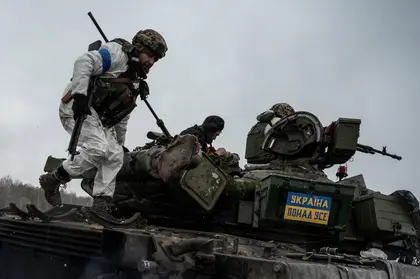In Philadelphia, on July 4, 1776, Americans declared their independence from Britain. Only 18 months later, General George Washington, leading a somewhat rag-tag Continental Army, was enduring a tough winter at Valley Forge, while British forces occupied Philadelphia and New York. Things looked bleak.
We know now that Washington was a brilliant general, that the American people had an iron-clad resolve to fight for freedom, and that with help from an outside power — France — the 13 colonies prevailed and truly established the United States of America. But in the winter of 1777-1778, no one could know this. It took an enormous effort of will, persistence, and moral clarity in the face of uncertainty. And a bit of outside help.
No doubt there were plenty of naysayers and armchair generals at the time who simply assumed the Americans would be defeated by overwhelming force and the superior resources of the British Empire. But Americans refused to give up. In the end, Britain’s resounding defeat resulted from long supply lines, American willpower, and foreign help.
Ukraine’s Independence Day falls on August 24, and for the second year in a row, it has been celebrated under the pressure of a full-scale Russian invasion. After 18 months of brutal fighting, much of Eastern and Southern Ukraine is still occupied, and another tough winter looms. Yet Russia has long supply lines, and Ukrainians have iron-clad will and outside help. Sound familiar?

ISW Russian Offensive Campaign Assessment, January 21, 2025
This year, Ukraine’s muted independence celebrations took place amid a growing chorus of commentary in the West arguing that Ukraine’s counteroffensive is failing, that Ukraine has made poor tactical and strategic decisions, that the West itself cannot continue to support Ukraine militarily and financially at the same level it has done to date, and that Ukraine cannot possibly recover all of its lost territory and must begin to negotiate with Russia.
Ukrainians are told to face reality and, in essence, to give up.
Would these same commentators have given the same advice to George Washington in 1777? Perhaps. And they would have been just as wrong. Such defeatism fundamentally underestimates the moral case, the utter resolve of people defending their lives and freedom, and the stakes that all free people have in their success.
Ukrainians are no more inclined to give up than Americans were in 1777-1778. So where is the call for Ukraine to negotiate coming from? It comes from those focused on a desire to stabilize relations with Russia, no matter what. That denigrates both the Ukrainian people and the cause of freedom they are fighting for. Some Westerners may feel they have the luxury of signing away Ukrainian lands along with its people and freedom. Ukrainians do not.
Obscured in all this is the fact that — contrary to the naysayers’ narrative — Ukraine’s counteroffensive is indeed making progress. The Ukrainians have methodically weakened and exhausted Russian forces, inflicting as many as 300,000 casualties including 120,000 dead. They have made substantial hits on Russian logistical supply chains. They have brought the war home to Russians in Moscow, and have launched complex drone attacks on military airfields, naval forces, and shipping.
The Russians have made no territorial gains since their destruction and temporary occupation of Bakhmut, while Ukrainian forces have kept up pressure along the entire front line – forcing Russia to defend in multiple areas – and have penetrated the first line of heavily mined areas in the south near Robotyne. This is opening a pathway to cutting off Russia’s supply lines to Crimea and Kherson and Zaporizhzhia provinces.
Back in Russia, we have seen a serious mutiny, the regime-orchestrated assassination of the uprising’s leader when his plane was blown out of the sky near Moscow, the flight of a million young Russians to avoid conscription, the growing impatience of non-ethnic Russian regions, and more. While Ukraine is advancing step-by-step, Russia is tearing itself apart.
Anyone who expected Ukraine’s counter-offensive to make rapid and substantial territorial gains had their expectations in the wrong place. Unlike the Russians, the Ukrainians care about protecting the lives of their soldiers and are proceeding in a careful, methodical, and patient manner. Of course, it might go faster if they already had M1A1 Abrams tanks, F-16 aircraft, and ATACMs long-range artillery in their inventory, but those articles have not yet arrived on the battlefield due to the West’s own slow decision-making. And yet, Ukraine is advancing.
No one today can know with certainty the outcome of Russia’s war against Ukraine. Perhaps Ukraine will fall. Perhaps Russia will pull itself together after tearing itself apart. But Ukraine has the reason and will to fight, while Russians do not. Ukraine has substantial outside help, while Russians only have Iran. Ukraine has a moral cause, while Russians do not.
Anyone who bet against George Washington in 1777-1778 would have lost. Anyone who bets against Ukraine in 2023-2024 should be prepared for the same outcome.
Ambassador Kurt Volker is a Distinguished Fellow at the Center for European Policy Analysis. A leading expert in US foreign and national security policy, he served as US Special Representative for Ukraine Negotiations from 2017-2019, and as US Ambassador to NATO from 2008-2009.
The views expressed in this opinion article are the author’s and not necessarily those of Kyiv Post.
Reprinted with the author’s permission from CEPA. See the original here.
You can also highlight the text and press Ctrl + Enter










